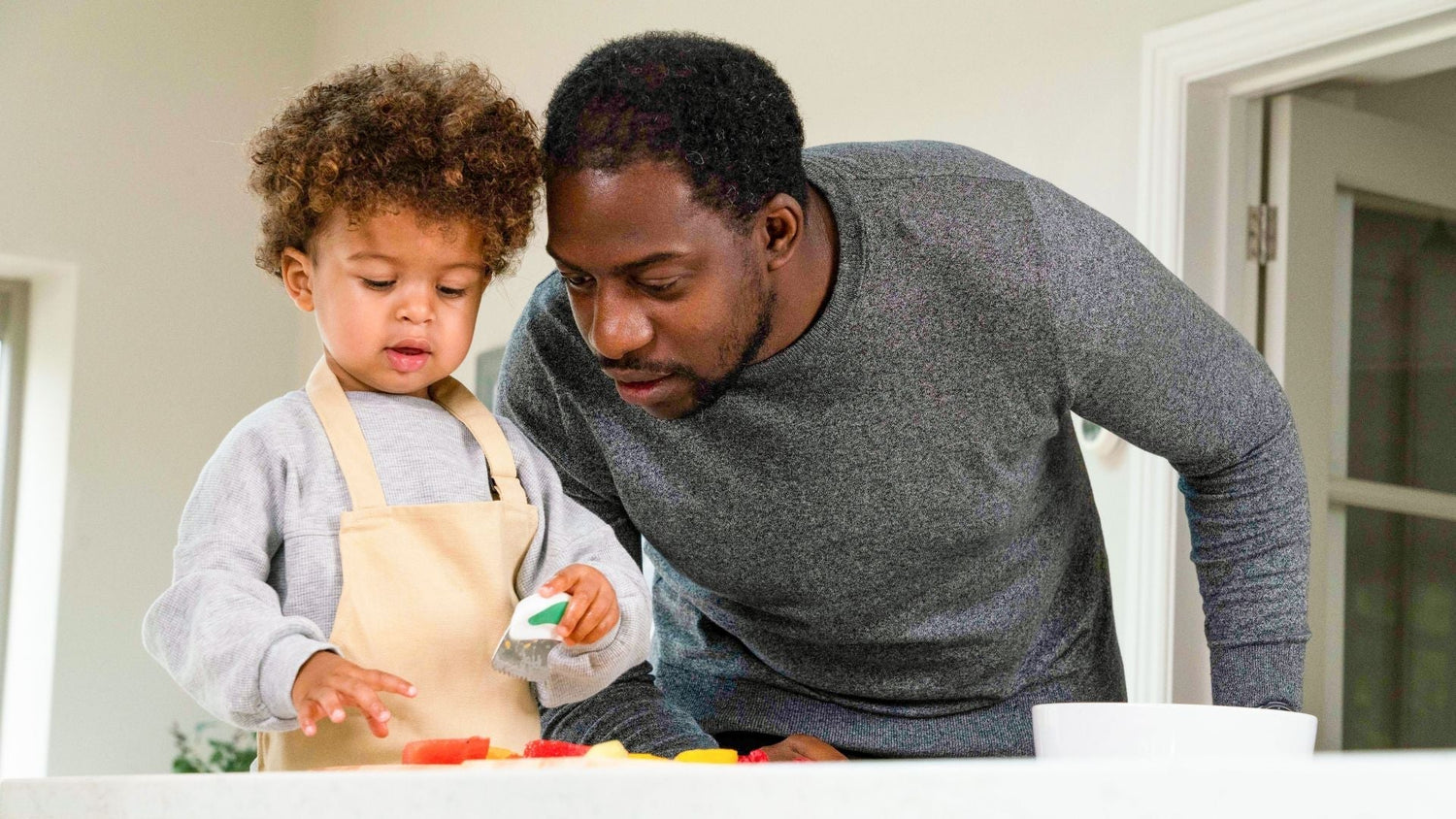Toddler speech development plays a powerful role in your little one’s life. Those early words and gestures help shape how they think, connect with others, and understand the world around them. From sharing feelings with mom and dad to solving problems, strong communication skills lay the foundation for learning, friendship, and emotional stability
Are you worried about your toddler’s language development? You’re not alone. Many parents wonder if their child is speaking "enough," or if their little one is hitting language milestones on time. These concerns are completely normal.
The good news? There are many fun, everyday ways to encourage your tot’s speech. There is no need for special programs or apps. All you need to do is have fun playtime, frequent conversations, lots of singing if you enjoy it, and shared moments to support your toddler’s language journey with love.
Understanding Toddler Speech Development

Every child develops at their own pace, but knowing what to generally expect can help you feel more confident that your tot is making progress. Check out our blog on two-year-old’s developmental milestones to learn more.
Toddler language milestones:
- 12–18 months: At this stage, most toddlers begin to say their first recognizable words like "mama," "dada," or "ball." They may understand simple instructions such as “come here” and begin using gestures like waving or pointing to express themselves. This is an exciting time. Many parents love to jot down their child’s first words in a baby book so they can cherish the moment for years to come. You might consider keeping a little journal of those first words and phrases. It's a sweet way to capture these milestones and look back on how your toddler’s language blossomed.
- 18–24 months: Vocabulary tends to grow quickly, many toddlers now know 50 or more words and start combining two-word phrases like “more juice” or “go park.” They also begin to name familiar people, objects, and animals. At this time, it probably feels like your toddler is making rapid progress as they truly begin to communicate with you.
- 24–36 months: Toddlers begin forming short sentences such as “I want toy” and asking basic questions like “What’s that?” You might notice early grammar skills emerging such as the use of plurals, verb endings, and pronouns.
Keep in mind that bilingual children or late talkers might reach these milestones later. That’s okay. As long as they’re making steady progress and showing interest in communication, variation is normal.
Practical Activities to Enhance Language Development

You don’t need fancy tools to nurture your toddler’s communication—just shared time, curiosity, and conversation. Here are a few simple, effective ways to help language skills grow:
Interactive Reading
The library is a magical place for a child. Each book holds an exciting story. Why not take your little one to the library and check out a few books?
Daily reading together strengthens language and builds a love for stories. Choose books with bold pictures, short sentences, and lots of repetition.
Let your toddler turn the pages, name objects, and fill in familiar words. Ask questions like, “Where’s the dog?” or “What is she doing?”
Even reading the same book again and again is a great way to reinforce language.
Daily Conversations
Every day, moments are filled with chances to talk with your little one. Whether you're brushing your teeth, taking a walk, or setting the table, narrate what you’re doing every step of the way so your child starts to associate the action with the words. Say, “Now we wash hands. Turn on the water. Bubbles!”
Use short, clear phrases and emphasize key words during your daily conversations with your little one. Pause to give your child time to respond, even if it’s just a sound or gesture.
Mealtimes with Meaning
Meals are perfect for one-on-one conversation. Talk about what’s on their plate: “That’s a crunchy carrot!” or “The soup is hot.”
Using intuitive toddler utensils like doddl can also help. These easy-to-hold tools let toddlers practice independence while offering natural moments to describe textures, tastes, and actions. Ask, “Can you scoop your peas?” or “Which one is your favorite?”
- Talk about food colors, shapes, and smells
- Encourage effort with phrases like, “You did it!”
- Use the calm mealtime setting to try new words
Singing and Rhyming
Most children love the sound of music. Even toddlers will jump to start dancing and sing along when a catchy tune comes on the radio or television.
Songs and rhymes help toddlers hear language patterns and rhythms. Sing classics like "Twinkle Twinkle Little Star" or make up your own silly songs.
Add clapping or gestures to keep things engaging. The repetition and melody help toddlers remember and enjoy new words.
Play-Based Learning
Playtime is rich with language-building opportunities. When your child pretends to feed a doll or build a tower, join in and narrate what’s happening. The process is a lot like reading but as the parent, you’ll help create the story. “You’re cooking soup! Stir, stir.” Toys like animal figures, toy kitchens, or blocks invite conversation, storytelling, and pretend dialogue.
Effective Communication Techniques for Parents and Caregivers

How you respond to your child’s early attempts at speech makes a big difference in how confident and motivated they feel to keep trying. You want your little one to feel at ease and be ready to truly talk to you.
Active Listening
When your toddler tries to say something, whether it’s a word, a sound, or a gesture, try to get down to their level. Make eye contact, smile, and respond warmly. This shows you’re interested in what they have to say, even if it’s not clear.
Language Expansion
You don’t need to correct your toddler—instead, build on their words. If they say “truck,” you might respond with, “Yes! A big red truck!” This helps introduce more vocabulary and sentence structure in a natural way.
Encouraging Expression
Create an environment where your child feels safe to try new words. Celebrate attempts with phrases like, “I love how you told me that!” or “You’re trying so hard!” Avoid pressuring them to speak on command; instead, give them time and space to express themselves when they’re ready.
Signs Your Toddler May Need Extra Support
Some toddlers may need a little help catching up, and that’s completely okay. Early support for toddler speech development can have a big impact.
Consider reaching out to a pediatrician or speech-language therapist if your child meets any of the following criteria.
- Isn’t saying any words by 18 months
- Doesn’t use two-word phrases by age 2
- Has trouble understanding simple directions
- Rarely tries to communicate or seems uninterested in others
Remember, you know your child best. If something feels off, trust your instincts. Professionals can provide reassurance, guidance, and, if needed, intervention.
Conclusion
Language development in toddlers is a journey. The beauty of sound is filled with sounds, giggles, and discoveries. With patience, encouragement, and daily connection, you can make a meaningful difference in your child’s speech and confidence.
Read stories together. Talk about your day. Sing silly songs and play make-believe. Every shared moment helps build the foundation for strong communication.
Let your toddler take the lead and have fun with doddl toddler utensils which are designed for little hands. The fun utensils can build confidence and foster conversations.
Ready to turn mealtime into a language-building adventure?
Your presence matters more than perfection. Keep talking, keep listening, and watch your toddler’s language skills blossom at their own beautiful pace.
FAQs: Supporting Your Toddler's Speech Development

How can I help my toddler develop speech naturally?
One of the best ways to support your child’s language development is by talking with your child during everyday routines. Narrate what you're doing as you do it, repeat their sounds, and respond to your little one’s communication, even if it's just pointing or babbling. Keep language simple and clear, and give them time to respond.
Can too much screen time cause speech delays?
Yes, research shows that excessive screen time, especially passive watching, can be linked to speech delays. Children who spend 3 to 4 hours a day in front of screens are at higher risk for delayed language development. Interactive time with people is more effective for building communication skills.
Why is my 3-year-old not talking but understands everything?
Some toddlers understand language well but struggle to let you know exactly what they think or feel because they just don’t have the words. This may be a speech delay or expressive language disorder. If your child isn’t speaking in simple sentences by age 3, it’s a good idea to speak with a pediatrician or speech-language pathologist.
Is it a speech delay or autism?
Speech delays can occur on their own or as part of another condition, like autism. If your child also struggles with eye contact, social interaction, or repetitive behaviors, then you might want to seek advice from a skilled medical professional.
How many words should a 2-year-old say?
By age 2, most toddlers use around 50 words and begin to combine two-word phrases like “more juice” or “go park.”
When should I seek professional help for a speech delay?
If your child isn’t saying any words by 18 months or isn’t combining words by 2 years, it’s a good time to check in with a speech-language therapist. Trust your instinct as a parent. Remember, all children are not the same, and they don’t develop at exactly the same rate. However, early support can make a big difference in helping your child communicate confidently.


